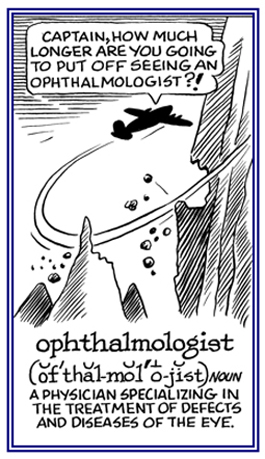ophthalmo-, ophthalm-, -ophthalmia, -ophthalmic, -ophthalmos
(Greek: eye; sight)
ophthalmodynamometry
The determination of pressure in the ophthalmic artery by use of an instrument that produces pressure on the eyeball until pulsations in the ophthalmic artery are seen through the ophthalmoscope, indicating the diastolic pressure or the period of the least pressure in the arterial vascular system.
As the pressure is increased, the vessel collapses and the systolic pressure (maximum blood pressure) is obtained.
Pain in the eye or eyes; ophthalmalgia: A corneal abrasion, optic neuritis, eye strain, and an eye infection are just a few origins of a condition of ophthalmodynia.
ophthalmoeikonometer
A device that measures the difference in size between the two ocular images.
ophthalmogram
A written description of the eyes; especially, during reading.
ophthalmograph
An instrument that photographs the movements of the eyes during reading.
ophthalmography
The recording of eye movements during reading.
ophthalmolith
A calculus (hardness, like a stone) of the lacrimal (tear) duct.
1. A physician who specializes in the care and treatment of the eyes: Marie was having trouble seeing things clearly from long distances so she made an appointment with an ophthalmologist to get the kind of eyeglasses that would help her have better vision.
2. Etymology: from Greek opthalmos, “eye" + -logia, "the study of".

© ALL rights are reserved.
Go to this Word A Day Revisited Index
2. Etymology: from Greek opthalmos, “eye" + -logia, "the study of".

Go to this Word A Day Revisited Index
so you can see more of Mickey Bach's cartoons.
ophthalmology
1. The medical and surgical specialty of eye care, including treatment of diseases of the eye and the correction of refractive errors.
2. The branch of health science dealing with the eye, including its anatomy, physiology, pathology, and other aspects.
2. The branch of health science dealing with the eye, including its anatomy, physiology, pathology, and other aspects.
ophthalmomalacia
Abnormal softening, or shrinkage, of the eyeball or eyeballs.
Divination by observing the eyes: Lisa was impressed with the art of ophthalmomancy which could interpret the reflections and colors of her daughter's eyes and provide information about her character.
ophthalmometer
An instrument for measuring the reflection of an image on the surface of the cornea and other capacities of the eye; used primarily for determining the presence and degree of astigmatism (visual impairment in which part of an image is blurred, due to an irregularity in the curvature of the front surface of the eye, the cornea).
ophthalmometry
1. Determination of the refractive powers and defects of the eyes.
2. Measuring the reflection of an image on the surface of the cornea and other capacities of the eyes, used chiefly for determining the presence and degree of astigmatism (a common form of visual impairment in which part of an image is blurred).
2. Measuring the reflection of an image on the surface of the cornea and other capacities of the eyes, used chiefly for determining the presence and degree of astigmatism (a common form of visual impairment in which part of an image is blurred).
Any disease of the eyes; oculopathy: One example of an ophthalmopathy is Grave's ophthalmopathy, also known as thyroid eye disease.
ophthalmophacometer
An ophthalmometer used to determine the refractive power of the lens.
Related references to "eye" or "eye part" word families: blepharo-; core-; corneo-; eye, eyes; irido-; lenti-, lens-; lenticulo-; ocelli-; oculo-; op-, -optic; phaco-; pupillo-; retino-; uveo-.


